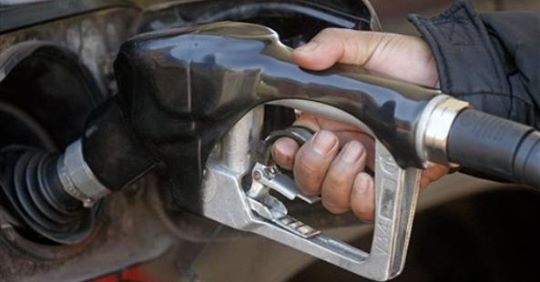
Higher prices of gasoline, diesel and cooking gas will greet Filipinos on the first day of 2020 as the third tranche of excise tax increases takes effect.
Smokers also will have to brace for higher prices of cigarettes and e-cigarettes.
The retail price of unleaded gasoline will go up P1 per liter and that of diesel by P1.50 per liter starting Jan. 1.
The price of liquefied petroleum gas (LPG) will also rise by P1 per kilogram.
The Tax Reform for Acceleration and Inclusion (TRAIN) Act raises to a cumulative P10 per liter or kilogram in 2020 from P9 in 2019 the excise on regular and unleaded gasoline, asphalts, denatured alcohol, lubricating oils and greases, naphtha and processed gas as well as waxes and petrolatum.
The TRAIN law, which took effect in 2018, will raise by P1.50 to P6 this year the excise on every liter of bunker and diesel fuel oil, and each kilogram of petroleum coke.
The excise on LPG will rise by P1 to P3 per kilogram, while the levy on kerosene will also be P1 higher at P5 per liter.
The higher oil excise rates for 2020 will take effect given that global prices remained below the $80-per-barrel threshold, at which the government can suspend scheduled hikes under the TRAIN law.
The new rates must nonetheless be applied only to fresh supply and not to carry-over stocks from 2019 or older.
As for domestic or imported coal and coke, the excise will jump P50 to P150 per metric ton.
Simplified income tax
The higher taxes on consumption of oil, sugary drinks, motor vehicles and cosmetic procedures were supposed to offset forgone revenue from the simplified personal income tax structure under TRAIN, in which annual net taxable income of below P250,000 is tax exempt.
The state-run Philippine Institute for Development Studies (PIDS) has said that higher oil excise taxes negatively affect poor families.
Taxes on cigarettes
But the Department of Finance (DOF) has claimed that the net impact of the TRAIN law, including more revenues for infrastructure projects, social services and unconditional cash transfers, would lead to sustained economic growth and poverty reduction.
As of September last year, net revenues from higher TRAIN taxes hit P91.3 billion, exceeding the nine-month target of P77.3 billion, latest DOF data showed.
In the case of cigarettes, the Tobacco Tax Law of 2019 will raise “sin” taxes to P45 per pack in 2020; P50 in 2021; P55 in 2022; and P60 in 2023, to be followed by 5-percent annual indexation from 2024 onward.
Under the TRAIN law, cigarette excise stood at P35 a pack as of July 2018 and would have had climbed to a lower rate of P37.50 per pack this year if the tobacco tax law had not been enacted.
For e-cigarettes, the tobacco tax law provided that heated tobacco products be levied an excise of P10 a pack beginning Jan. 1, to be followed by yearly hikes of 5 percent starting 2021.
Vaping products
As for vapor products, individual cartridges, refills, pods or containers of liquid solutions will be slapped a tax of P10 per 10 ml, or a larger P50 on top of P10 per additional 10 ml for those being sold in volumes higher than 50 ml in 2020.
The new excise rates on heated tobacco and vaping products will be implemented following the formal entry last year of US-based Juul and China-based RELX into the Philippine market and the ban on vapes ordered by President Duterte.
Philip Morris was planning to launch its iQOS heated tobacco products in the Philippines by the first half of 2020.
The higher cigarette and e-cigarette taxes form part of package “2 plus” of the Duterte administration’s comprehensive tax reform program.
But Finance Secretary Carlos Dominguez III earlier said the rates to be slapped on e-cigarettes were “too low,” hence the DOF later pushed for rates at par with traditional cigarettes on top of a bigger levy on alcoholic drinks.
In December, the two chambers of Congress passed the bill that would impose P25 per pack on heated tobacco products starting 2020, and P45 per 10 ml for conventional free-base vapor products and P37 per ml in the case of salt nicotine vapes.
The bill will also prohibit selling heated tobacco and vaping products to those aged 21 and below as well as nonsmokers.
Also in the Congress-approved bill was a new specific tax of P35 per liter to be slapped on fermented liquors such as beer, while sparkling and still wines will be taxed P50 a liter.
Both “alcopops” (flavored alcoholic drinks) and distilled spirits (including brandy, gin, rum, vodka and whiskey) will be levied a 22-percent ad valorem tax, on top of specific tax worth P42 per proof liter this year.
On Monday night, Assistant Finance Secretary Tony Lambino told the Inquirer the DOF had yet to receive word if Mr. Duterte had already signed into law the bill further jacking up alcohol and e-cigarette tax rates.
But ideally, the DOF wants higher taxes on e-cigarettes and alcohol products implemented on Jan. 1 to serve as a simpler reckoning in the books of business establishments.
Based on DOF estimates, the Congress-approved sin tax bill would raise P22.2 billion when implemented in 2020.
Universal health care
In the next five years, these higher sin taxes would generate a total of P137.2 billion in additional revenues.
Dominguez has said that since the additional levy on alcoholic drinks, heated tobacco and vaping products approved by Congress is lower than originally proposed and will generate less revenues than needed, funds to implement the universal health care law this year may fall short.
The government would need about P258 billion for universal health care in 2020 and “sin” taxes were among its major sources of funding.